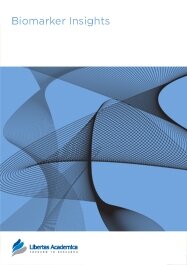

Publication Date: 10 Jul 2012
Type: Original Research
Journal: Biomarker Insights
Citation: Biomarker Insights 2012:7 87-104
doi: 10.4137/BMI.S9776

Background: Biomarkers facilitate early detection of disease and measurement of therapeutic efficacy, both at clinical and experimental levels. Recent advances in analytics and disease models allow comprehensive screening for biomarkers in complex diseases, such as asthma, that was previously not feasible.
Objective: Using murine and nonhuman primate (NHP) models of asthma, identify biomarkers associated with early and chronic stages of asthma and responses to steroid treatment.
Methods: The total protein content from thymic stromal lymphopoietin transgenic (TSLP Tg) mouse BAL fluid was ascertained by shotgun proteomics analysis. A subset of these potential markers was further analyzed in BAL fluid, BAL cell mRNA, and lung tissue mRNA during the stages of asthma and following corticosteroid treatment. Validation was conducted in murine and NHP models of allergic asthma.
Results: Over 40 proteins were increased in the BAL fluid of TSLP Tg mice that were also detected by qRT-PCR in lung tissue and BAL cells, as well as in OVA-sensitive mice and house dust mite-sensitive NHP. Previously undescribed as asthma biomarkers, KLK1, Reg3, ITLN2, and LTF were modulated in asthmatic mice, and Clca3, Chi3l4 (YM2), and Ear11 were the first lung biomarkers to increase during disease and the last biomarkers to decline in response to therapy. In contrast, GP-39, LCN2, sICAM-1, YM1, Epx, Mmp12, and Klk1 were good indicators of early therapeutic intervention. In NHP, AMCase, sICAM-1, CLCA1, and GP-39 were reduced upon treatment with corticosteroids.
Conclusions and clinical relevance: These results significantly advance our understanding of the biomarkers present in various tissue compartments in animal models of asthma, including those induced early during asthma and modulated with therapeutic intervention, and show that BAL cells (or their surrogate, induced sputum cells) are a viable choice for biomarker examination.
PDF (1.47 MB PDF FORMAT)
RIS citation (ENDNOTE, REFERENCE MANAGER, PROCITE, REFWORKS)
Supplementary Files 1 (27.90 KB ZIP FORMAT)
BibTex citation (BIBDESK, LATEX)
XML
PMC HTML

I would like to extend my gratitude for creating the next generation of a scientific journal -- the science journal of tomorrow. The entire process bespoke of exceptional efficiency, celerity, professionalism, competency, and service.
Facebook Google+ Twitter
Pinterest Tumblr YouTube